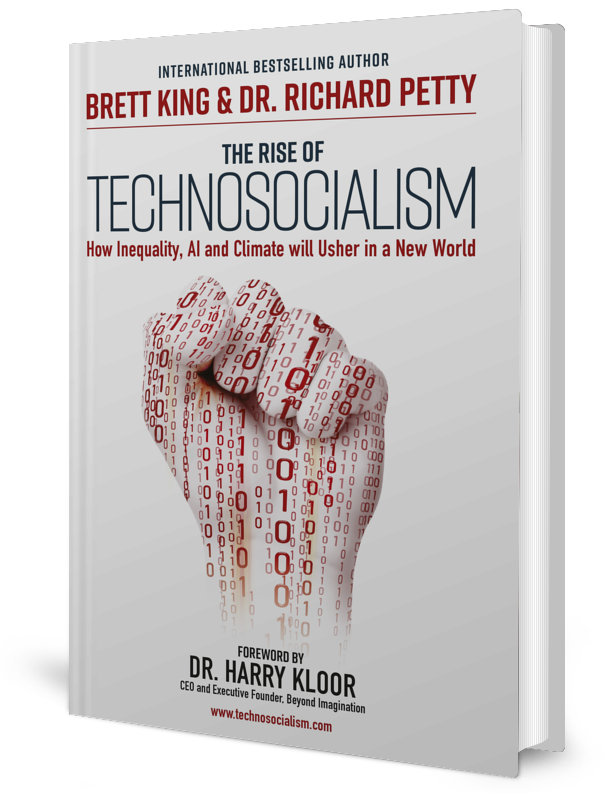Community Reviews

“The book is fantastic-5 stars, one of the best books that I’ve read in a long time” “providing optimistic suggestions about the future” Adam Thompson – reviewed on Amazon.de
“If you are deeply concerned about where society is heading read this book , if you fear a darker dystopian future for your kids and grandkids this book may just lift your spirits” Bill Roberts – reviewed on Amazon.com.au
“Great insight – I have always enjoyed Bretts book on fintech etc but here he goes wider – considering the impact of tech on society and how people live their lives. With so much happening in the world this view through the lens of tech adds some great insight – especially as the authors really understand tech and how is already changing business. Essential reading” Simon Andrews – reviewed on Amazon.co.uk
“A Must-Read View of the Future – This is a must read book for anyone in business or who embraces how technology can positively impact humanity”. Jim Marous reviewed on Amazon.com
“The World Is Changing Quicker Than You Think – Technology can be an equalizer in a shrinking world. Its role in supporting equality globally is profound in a world redefined by the pandemic. Every aspect of life is impacted by our ability to leverage technology for the better good. A must read, particularly if you’re an optimist” Bryan Clagett on reviewed on Amazon.com
a brilliant maze of mysteries – For the past 17 years my research has centred on the question of ‘how do we increase our capacity to adapt to a world of accelerated change?’ – This question, unlike a closed puzzle where we know what the answer will look like before we begin, or an open puzzle where we need to figure out the answer as we go, this question behaves more like a mystery that keeps us on the edge of our seats and induces our curiosity and fascination every step of the way, and just when we think we know the answer, another mystery emerge” Lisa Johnston reviewed on Amazon.com.au
“Many of the deep challenges of this period in human history are becoming increasingly evident. This is a time when we must re-evaluate where we are heading and look for alternatives. The Rise of Technosocialism does exactly this, going into detail on today’s massive problems including accelerating climate change, social divisions, and food and water scarcity, and provides a detailed and compelling case for a quite different social structure.
The phrase ‘technosocialism’ is provocative, but it points to the transformative potential of technology, designed and used well, integrated into economic and social structures that allow the broadest possible participation in the affluence that we could yet create. It is certainly not a techno-utopian screed, it is fully grounded in the challenges of changing our current models, but offers a clear path on how we could create a different foundation for society.
For those who are aligned with the book’s intent it provides data, logic, and clarity on what we should be lobbying for. Even those who may disagree with the book’s premises should read it, at very least it will help them better frame their own alternative approaches to creating a better tomorrow.
This is a debate we absolutely must have, the book provides a rock solid foundation for it” Ross Dawson reviewed on Amazon.com.au
Get out your wide angle lens and look at our place in history – and the possible paths from here. Hugely enjoyable (favourite book of the year so far) and reminiscent of 2121 (21 lessons for the 21st century). The key to understanding the subject of this book is through the sub-title “How inequality, AI and Climate will usher in a new world”. Inequality, the rise of AI, (lack of) action on Climate change are all facts about our world today, but what is uncertain is how we will respond to these facts. The book outlines four very different futures – the one that seems most probable to you may depend on whether your glass is half-empty or half-full and how much faith you put in technology being able to save us from ourselves. While the book has a backdrop of the great arc of history, it feels very current, with well thought out impacts of Covid-19 on existing megatrends. The authors have a great grasp of economics and technology, seem well travelled and avoid the trap of nationalistic bias, but most importantly they have the ability to zoom out of day to day reality and place the reader hovering above the timeline – seeing where we’ve been, where we really are today and where we are most likely heading. I found myself constantly heading off to the web to look up things the book referred to (hello four hours of Elon Musk interviews) but thoroughly enjoyed the ride. Recommended. BSD reviewed on Amazon.com.au
“An inspirational path forward for the future of humanity – If we follow the path of technosocialism as outlined in this book, then there is indeed an opportunity to restore global freedoms, improve societal conditions, and provide equity and abundance across economic statuses around the world. With the content this book offers, it is worth a close examination and thoughtful discussion. First, though, we have to deal effectively with today’s failed societal state, or failing state, as it exists. And to do that, we must look back to how we arrived here. This book does that, first with close look back, though not in pain-staking detail. (Those who want painstaking details about how Generation X got screwed over should read my books in addition to this one. This book is not about that.) This book walks us back socially, economically, and financially how the current system has failed most people. It’s analysis is thought provoking and important enough to be able to obtain a vision of the future, and develop a personal thesis on how technosocialism has arisen for them, in addition to overall society.” Jamil Hasan reviewed on Amazon.com
Richard Turrin – A must that delivers practical preparation for the new digital world we’re just entering, Richard Turrin reviewed on Amazon.com
“Brilliant – The Rise of Technosocialism is inspiring, educational, informative and funny. It deals with the biggest challenges of our time in an entertaining way and points to the way for a better future. I loved reading this book” Hope reviewed on Amazon.com
“Personally I wasn’t sure what to expect from such a sensational title, but I’ve actually really enjoyed the book. It gives a broad historical overview of the key macroeconomic developments of the 20th century – mainly from the point of view of the the US and the UK, but then also considers key players for the 21st century like China, India and Brazil. They find that capitalism, and free markets in particular, generally don’t reward businesses for addressing social issues, and so changes in policy are needed. The book is less about economic theory and more about a what actually happens. They also set out some clear plans for how we might harness AI, and deal with some if the most urgent issues we face – including climate change and inequality. And it manages to do this without getting too heavy – the writing style is accessible and not too formal. Recommend!” Joe reviewed on GoodReads.com
Great overview of what is coming – The Rise of Technosocialism is not just a timely road map for anyone trying to navigate the confluence of changes impacting society, but a detailed primer for creating a more equitable and sustainable world. Brett King and Dr. Richard Petty deliver a compelling and optimistic plan for humanity to move forward together as a species. Jay Samit On Amazon.com
How Technology could improve your life – This is the second book I read from Brett King. What I enjoy is the wider perspective reading his books give me. In this book, the Rise of Technosocialism, I’m seeing technology and it’s purpose from a wide range then the ones I use it for. As I can only refer to my life experience for what I know, and the rest of the world experiences their life with in their own unique ways. I’ve most often heard how technology widens the wealth gap. Starting the read I’ve started to see that it can also bridge the gap, as technology makes things cheaper to access, and therefore more accessible to all. I’m looking forward to learn more ways in which technologies can help all of us, and I might even discover ways it can help me right now enhance my lifestyle. I can than share that information to those around me so that they may enhance their lifestyle too.I wasn’t ML Barot Tara on Amazon.com
insightful historical analysis to provocative and pragmatic forward thinking, a very timely read – The authors have carefully explored the wandering social, political, economic, and environmental history that has led us to where we are today. More specifically, they clearly connect the dots between these forces in a very consumable and non-partisan way that ultimately sheds light on legitimate promise for the future. One can’t help but commiserate and reflect when reading on the falsehoods of the past that have led to massive inequality, social strife, and a world gone wrong in so many ways. Somewhere in the mix we need innovation, technological liberation, and benevolence to win out over political short-termism and the ego-driven accumulation of wealth by the few. This book spells out those problems and the opportunities for solutions – and helps you think just a little bit differently about what’s going on around us. It’s all thoughtfully packaged up with more than enough references and ample research to satisfy the most discerning reader. A great read! Michael Smit on Amazon.ca
A “must have” debate about the future of humanity with technology – Brett King unites humanity and technology in a purpose-driven compelling narrative. The book opens and further enriches a “must have” debate about the seismic social changes that will be thrust on the world over the coming decades. Brett’s view is balanced and sets the tone, I enjoyed reading. You will enjoy too. Paolo Sironi on Aamazon.de
The World Is Changing Quicker Than You Think – Technology can be an equalizer in a shrinking world. Its role in supporting equality globally is profound in a world redefined by the pandemic. Every aspect of life is impacted by our ability to leverage technology for the better good. A must read, particularly if you’re an optimist. Bryan E Clagett on Aamzon.com
Another excellent book from Brett King – Brett King is an excellent author. His first books have been very influential in the FinTech space and this latest one sets the bar again.. Henri A on Aamzon.com

Author Brett King
Brett King is an entrepreneur, futurist, and International Bestselling Author.
China’s President Xi Jinping cited his book Augmented: Life in the Smart
Lane in his 2018 national address; Augmented was a Top 10 non-fiction book
in North America. In 2019 his book Bank 4.0 was awarded the Top Book by a
Foreign Author in Russia. In 2015 he was shortlisted for the Advance Global
Australian of the Year Award. Banking Exchange magazine dubbed him the
“King of Disruptors”. He advised the Obama Administration, and governments
and regulators around the world on future tech.

Author Dr Richard Petty
Dr Richard Petty is a policy advisor, entrepreneur and awarded academic.
Based in Hong Kong, Richard has lived and worked in Greater China since the
1990’s. Richard has chaired entities with global footprint, and presently sits on
the boards of listed companies in the United States and Australia. He has
advised on projects with an aggregate economic impact in the hundreds of
billions of dollars, and has led studies on economic competitiveness. Richard
previously served as a member of the B20—the official G20 dialogue forum
with the global business community—on the Financing Growth and
Infrastructure Taskforce. Richard has authored or co-authored more than 100
academic and professional works including several books, and several of his
journal articles are among the top cited in their fields.